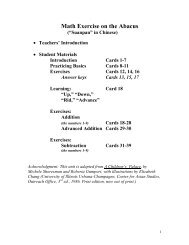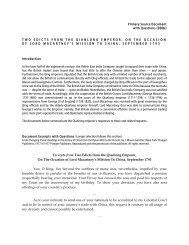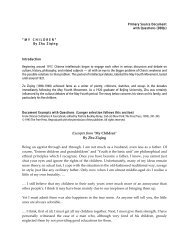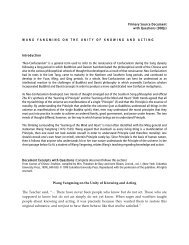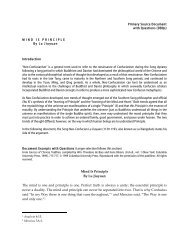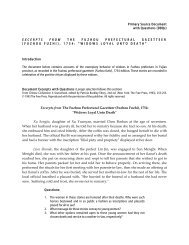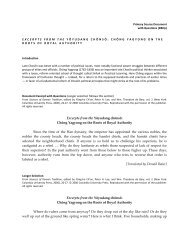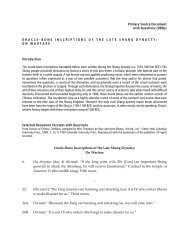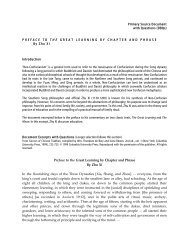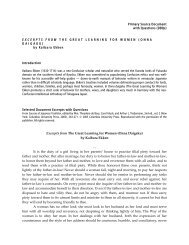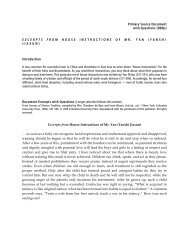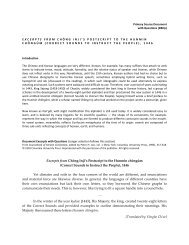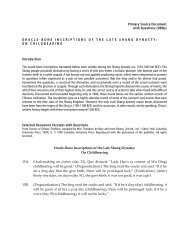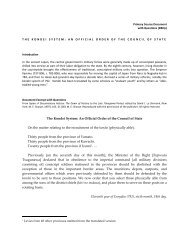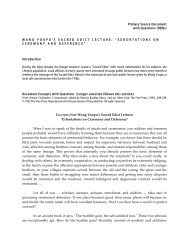Remonstrance Against the New Laws, By Cheng Hao - Asia for ...
Remonstrance Against the New Laws, By Cheng Hao - Asia for ...
Remonstrance Against the New Laws, By Cheng Hao - Asia for ...
Create successful ePaper yourself
Turn your PDF publications into a flip-book with our unique Google optimized e-Paper software.
Prim ar y S our ce Doc um e nt<br />
wi t h Qu e st io n s ( D BQ s)<br />
R E M O N S T R A N C E A G A I N S T T H E N E W L A W S<br />
B y C h e n g H a o<br />
Int rod uct io n<br />
The Song dynasty (960-1279) was weaker than its predecessor, <strong>the</strong> Tang, and ruled over a smaller territory. To <strong>the</strong><br />
north and northwest, <strong>the</strong> Song faced strong alien regimes: <strong>the</strong> Khitan Liao dynasty (907-1125) and <strong>the</strong> Tangut Xixia<br />
(990-1227). These regimes posed a constant military threat, which <strong>the</strong> Song defused by making payments of silk and<br />
o<strong>the</strong>r goods to both <strong>the</strong> Xixia and <strong>the</strong> Liao according to negotiated agreements. Still, <strong>the</strong> burden of maintaining<br />
troops <strong>for</strong> <strong>the</strong> defense of <strong>the</strong> empire was significant and caused serious financial problems <strong>for</strong> <strong>the</strong> imperial<br />
government (<strong>the</strong> cost of <strong>the</strong> payments to <strong>the</strong> Xixia and <strong>the</strong> Liao was small by comparison).<br />
The officials of <strong>the</strong> Song dynasty approached <strong>the</strong> task of government with <strong>the</strong> inspiration of a reinvigorated<br />
Confucianism, which historians refer to as “Neo-Confucianism.” Song officials such as Fan Zhongyan (989-1052), Su<br />
Shi (1037-1101, also known by his pen name, Su Dongpo), and Wang Anshi (1021-1086) worked to apply Confucian<br />
principles to <strong>the</strong> practical tasks of governing. As with any group of scholars and officials, different individuals had<br />
different understandings of just what concrete measures would best realize <strong>the</strong> moral ideals articulated in <strong>the</strong><br />
Analects and Mencius. Such disagreements could be quite serious and could make or unmake careers.<br />
Wang Anshi was a noted scholar and official. He distinguished himself during a long term of service as a country<br />
magistrate. In 1068, <strong>the</strong> young Shenzong Emperor (r. 1068-1085), <strong>the</strong>n twenty years old, appointed Wang Anshi as<br />
Chief Councilor and charged him with carrying out a thorough-going re<strong>for</strong>m of <strong>the</strong> empire’s finances, administration,<br />
education, and military. The intention was to address a serious problem: declining tax revenue and mounting<br />
government expenses, including <strong>the</strong> huge and growing cost of maintaining a large standing army. Wang Anshi<br />
proposed a series of re<strong>for</strong>ms, which were carried out. Many in <strong>the</strong> court disagreed with <strong>the</strong> re<strong>for</strong>ms. The following<br />
document is a memorial in which <strong>Cheng</strong> <strong>Hao</strong> (1032-1085), a contemporary and <strong>for</strong>mer supporter of Wang Anshi, tells<br />
<strong>the</strong> emperor what he thinks of <strong>the</strong> “<strong>New</strong> <strong>Laws</strong>.”<br />
Docu m e n t E xc erpt s w it h Q ue s tio n s (Complete document follows this section)<br />
From Sources of Chinese Tradition, compiled by Wm. Theodore de Bary and Irene Bloom, 2nd ed., vol. 1 (<strong>New</strong> York: Columbia<br />
University Press, 1999), 618-619. © 1999 Columbia University Press. Reproduced with <strong>the</strong> permission of <strong>the</strong> publisher. All rights<br />
reserved.<br />
<strong>Remonstrance</strong> <strong>Against</strong> <strong>the</strong> <strong>New</strong> <strong>Laws</strong> <br />
<strong>By</strong> <strong>Cheng</strong> <strong>Hao</strong> <br />
<br />
The mind of Your Majesty does not hesitate to make a change; it is only <strong>the</strong> minister in charge of <br />
<strong>the</strong> government who still persists in his obstinacy. Thus <strong>the</strong> people’s feelings are greatly <br />
agitated and public opinion becomes more clamorous. If one insists on carrying <strong>the</strong>se policies <br />
out, certain failure awaits <strong>the</strong>m in <strong>the</strong> end. … Ra<strong>the</strong>r than pursue one mistaken policy at <strong>the</strong> <br />
expense of a hundred o<strong>the</strong>r undertakings, would it not be better to bestow a grand favor and
Prim ar y S our ce Doc um e nt , wit h Qu e st io n s (D B Q s) on<br />
RE M O NS TR A N CE A G AIN ST T HE NE W L A W S, B Y CH E NG H A O<br />
reassure <strong>the</strong> people’s minds by doing away with <strong>the</strong> disturbances caused by those sent out to <br />
en<strong>for</strong>ce <strong>the</strong>se decrees and by manifesting your humanity to <strong>the</strong> extent of abolishing <strong>the</strong> interest <br />
charged on <strong>the</strong> crop loans? <br />
<br />
Q ue st io n s:<br />
1. On what grounds does <strong>Cheng</strong> <strong>Hao</strong> criticize <strong>the</strong> Crop Loans measure?<br />
2. How does <strong>Cheng</strong> <strong>Hao</strong> view <strong>the</strong> responsibility of <strong>the</strong> emperor?<br />
3. According to Confucian principles, how should an emperor react to such<br />
advice?<br />
Comp l et e Doc um e nt<br />
From Sources of Chinese Tradition, compiled by Wm. Theodore de Bary and Irene Bloom, 2nd ed., vol. 1 (<strong>New</strong> York: Columbia<br />
University Press, 1999), 618-619. © 1999 Columbia University Press. Reproduced with <strong>the</strong> permission of <strong>the</strong> publisher. All rights<br />
reserved.<br />
<strong>Remonstrance</strong> <strong>Against</strong> <strong>the</strong> <strong>New</strong> <strong>Laws</strong> <br />
<strong>By</strong> <strong>Cheng</strong> <strong>Hao</strong> <br />
<br />
Recently, your servant has presented repeated memorials asking <strong>for</strong> <strong>the</strong> abolition of <strong>the</strong> <br />
advancing of crop loans at interest 1 and abolition of <strong>the</strong> [Economic] Administrators. 2 Day and <br />
night [your servant] waits expectantly, and yet Your Majesty still has not acted upon <br />
<strong>the</strong>m. … <br />
<br />
Now whe<strong>the</strong>r <strong>the</strong> state is secure or insecure depends upon <strong>the</strong> feelings of people; whe<strong>the</strong>r <strong>the</strong>re <br />
is order or disorder hinges upon how things are handled at <strong>the</strong> start. If great numbers of people <br />
are opposed, <strong>the</strong>n whatever one may say, one will not be believed; but if all <strong>the</strong> people are of <br />
one accord, <strong>the</strong>n whatever one does will certainly succeed. … <br />
<br />
Your servant considers that Your Majesty already sees clearly into <strong>the</strong> heart of <strong>the</strong> matter and <br />
fully realizes what is right and what wrong. The mind of Your Majesty does not hesitate to <br />
make a change; it is only <strong>the</strong> minister in charge of <strong>the</strong> government who still persists in his <br />
obstinacy. Thus <strong>the</strong> people’s feelings are greatly agitated and public opinion becomes more <br />
clamorous. If one insists on carrying <strong>the</strong>se policies out, certain failure awaits <strong>the</strong>m in <strong>the</strong> end. … <br />
Ra<strong>the</strong>r than pursue one mistaken policy at <strong>the</strong> expense of a hundred o<strong>the</strong>r undertakings, would <br />
it not be better to bestow a grand favor and reassure <strong>the</strong> people’s minds by doing away with <strong>the</strong> <br />
disturbances caused by those sent out to en<strong>for</strong>ce <strong>the</strong>se decrees and by manifesting your <br />
humanity to <strong>the</strong> extent of abolishing <strong>the</strong> interest charged on crop loans? Moreover, when <strong>the</strong> <br />
<br />
1 The text is vague here, referring only to “advance allocations.” <br />
2 Administering <strong>the</strong> various economic activities of <strong>the</strong> government, such as <strong>the</strong> Ever‐Normal Granaries, <br />
<strong>the</strong> salt and iron monopolies, and so on. <br />
As ia fo r E du cat ors | Colu m bia U niv ers it y | ht t p:/ /af e. ea s ia.colu m bia. e du Page 2 of 3
Prim ar y S our ce Doc um e nt , wit h Qu e st io n s (D B Q s) on<br />
RE M O NS TR A N CE A G AIN ST T HE NE W L A W S, B Y CH E NG H A O<br />
system of buying and selling grain is put back into effect, 3 our accumulated reserve will expand. <br />
The government will <strong>the</strong>n be without fault in its administration, and public opinion will have <br />
no cause to be aroused. <br />
<br />
3 That is, when <strong>the</strong> reserves of <strong>the</strong> Ever‐Normal Granaries are used <strong>for</strong> price‐support operations ra<strong>the</strong>r <br />
than being committed to <strong>the</strong> lending program. <br />
As ia fo r E du cat ors | Colu m bia U niv ers it y | ht t p:/ /af e. ea s ia.colu m bia. e du Page 3 of 3



